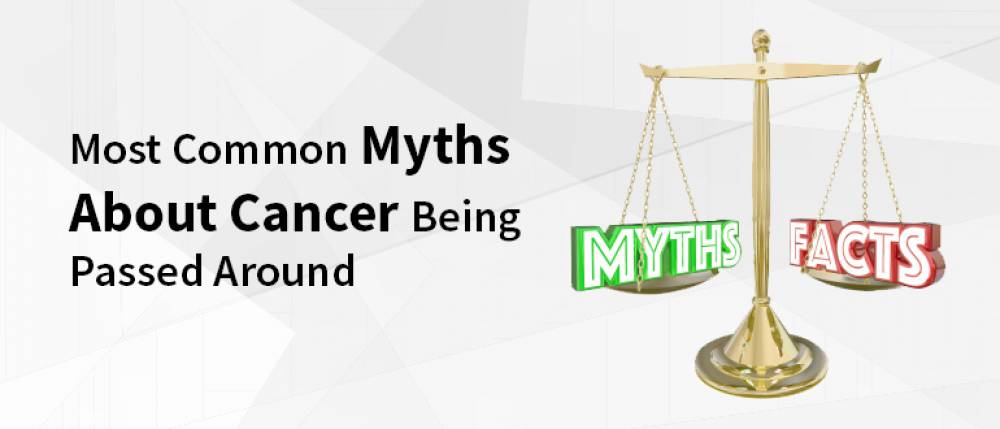Plenty of myths get passed around by people when it comes to cancer. Little does anyone know that myths that float around add more anxiety and stress for the patients already battling cancer. Misinformation always leads to more significant problems that are often irreversible. The internet is flooded with misconceptions about what does and what doesn't cause cancer and the numerous things to avoid to cure cancer. Although these myths float in good spirits, they have no relevance or rationality that proves their results.
If you are the one who believes in myths, here we bust the 7 most common myths about cancer that have been prevalent for years. Read through to debunk them one by one.
7 Most Common Myths About Cancer
Many myths are often mistaken for cancer risk factors, and falling prey to them can not be pleasant for anyone on the recovery journey. Here we have narrowed down 7 myths about cancer that has been airing for years:
#Myth 1- Cancer is transmissible
Fact- Cancer is not transmissible. However, a few cancers are caused by viruses and bacteria that may spread from one person to another. Human papillomavirus (HPV) is known to cause anal and cervical cancers. Hepatitis B and hepatitis C are viruses with a high risk of developing liver cancer. H. pylori is a bacteria that can cause stomach cancer. However, it is crucial to understand that while viruses and bacteria can be contagious, the cancers they cause cannot be transmissible.
#Myth 2- Cancer Treatment Hurts more than Cancer
Fact- One of the primary reasons for this myth is prevalent because cancer is usually diagnosed at a much later stage. With the advanced stage of cancer, an aggressive course of treatment is often required to increase the chances of recovery. The cancer spreads to other organs in the body during the later stages of cancer, which may result in bleak chances of recovery. Chemotherapy and radiation therapy have serious side effects that cause many people to question the effectiveness of the treatment. However, when cancer is diagnosed at an early stage, the chances of recovery are much higher than in the advanced stage.
#Myth 3- Gadgets Cause Cancer through Radiation
Fact- The fact is that cell phones, computers and microwave ovens omit low-frequency radio waves, not damaging genes and causing cancer. Many people are unaware that there is high background radiation in the environment, and none of it proves to be the cause of cancer. However, one should be careful in restricted areas marked with ‘radioactive hazard’ signs.
#Myth 4- All Kinds of Cancer can be Treated the Same Way
Fact- Cancer is the term given to a group of health conditions with the common nature of uncontrolled cell division that spreads to the tissues and the rest of your body. There are over 100 types of cancer, but none react similarly in everybody. People with the same kind of tumour in the same body part undergo different genetic changes and need different treatments.
#Myth 5- Only Smokers Get Lung Cancer
Fact- smokers are at a high risk of lung cancer, people who don’t smoke can also be vulnerable. Exposure to harmful substances such as asbestos, uranium, radon, passive smoke and arsenic can also result in developing lung cancer. Lung cancer can also be caused by scarring in the lung tissue due to pre-existing illnesses or infections.
#Myth 6- Cancer Occurs Only When there is a Family History
Fact- Genetic defects in DNA may indeed result in cancer; many believe that not having a history of cancer in the family means they are not likely to develop cancer. Inherited genetic mutations cause only about 5 – 10% of cancer cases, whereas the remaining 90 – 95% of cases result from lifestyle and environment– smoking and exposure to cancer-causing chemicals are two significant causes of cancer. However, people with a history of cancer in their bloodline should get screening done regularly and maintain a healthy lifestyle as they are more vulnerable.
#Myth 7- Superfoods Help Prevent Cancer
Fact- Superfoods known to fight cancer include blueberries, beets, broccoli, garlic, and green tea. These foods are undoubtedly beneficial to your health as they have beneficial benefits in the battle against cancer, such as antioxidant content that aid in removing toxins from the body. However, believing that any particular food can prevent cancer is absolutely naive. Everybody is unique, and every person's cancer response is unique. No one meal or food group can adequately protect against cancer. They can only give you the strength to fight cancer.
The myths mentioned above circulate via word of mouth or social media/online platforms, adding to the anxiety and fear. This blog might help you dispel widespread misconceptions about cancer so that you can fight it more bravely without thinking about these myths.
>>Also Read: Cancer Prevention Diet - Best Foods to Lower Your Risk of Cancer
What Should You Do to Protect Yourself Against Hefty Cancer Treatment Costs?
Cancer treatment expenses can indeed touch the roof and burn a hole in your pocket, and may exhaust all your savings. However, if you secure yourself with a cancer insurance plan, it will provide you with a safety net to cover most of your medical expenses related to cancer treatment. So, it is highly recommended to have a comprehensive cancer insurance plan by Care Health Insurance so that all your stress related to finances is taken care of during any unfortunate event of a cancer diagnosis. Thus, proactive financial planning will secure your financial future by providing a peaceful state of mind to fight the disease.
Disclaimer: The above-mentioned information is for reference purposes only. Please consult with your health practitioner in case of any queries.
